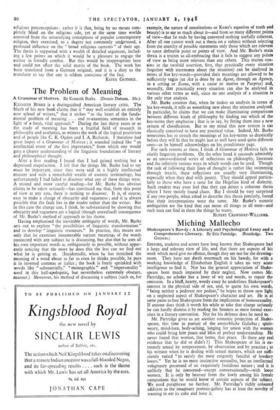The Problem of Meaning
A Grammar of Motives. By Kenneth Burke. (Dennis Dobson. 30s.).
KENNETH BURKE is a distinguished American literary critic. The blurb of his new book claims that it " may well establish an entirely new school of writers," that it strikes " to the heart of the funda- mental problem of meaning . . . and re-examines semantics in the light of a fresh, vital approach." During the last thirty years or so the study of meaning has been a fruitful field of research in philosophy and aesthetics, as witness the work of the logical positivists and of people like C. K. Ogden and I. A. Richards. I therefore had great hopes of a Grammar of Motives ; it sounded indeed like " an intellectual event of the first importance," from which one would gain a clearer understanding of the linguistic foundations of literary and philosophical thought.
After a first reading I found that I had gained nothing but a depressed stupefaction. I felt that the things Mr. Burke had to say must be important, since they were said in a highly intellectual manner and with a remarkable wealth of esoteric terminology, but unfortunately I had failed to discover what any of these things were. A second and more careful reading—for Mr. Burke has obvious claims to be taken seriously—has convinced me that, from this point of view at any rate, there is nothing to discover. It is, of course, easy to make a charge of obscurity and vagueness ; and it is always possible that the fault lies in the reader rather than the writer. But in this case the charge can, I think, be substantiated by showing that obscurity and vagueness are a logical (though unrealised) consequence of Mr. Burke's method of approach to his theme.
Having emphasised the inevitable ambiguity of words, Mr. Burke sets out to explore " the possibilities of linguistic transformation " and to develop " linguistic resources." In practice, this means not only that he examines innumerable variant meanings of the words connected with any subject he is discussing, but also that he uses all his own important words as ambiguously as possible, without appar- ently noticing that the more he does this the less can we find out what he is getting at. (Incidentally, when he has Stretched the meaning of a word about as far as even he thinks possible, he puts it in inverted commas or italics ; the book is freely sprinkled with words like " substantially," " monographic " and " impersonality " used in this half-apologetic, but nevertheless extremely obscure, manner.) Moreover, his method of discussing a subject (such as, for example, the nature of constitutions or Keats's equation of truth and beauty) is to say so much about it—and from so many different points of view—that he ends by having conveyed nothing usefully coherent. After all one cannot work out a •thesis on a subject without selecting from the anarchy of possible statements only those which are relevant to some definable point or points of view. And Mr. Burke's main thesis is a truism so all-embracing that it fails to suggest any points of view as being more relevant than any others. This truism con- sists in the twofold assertion, first, that practically every situation (together with statements about the situation) can be analysed in terms of five key-words—provided their meanings are allowed to be sufficiently vague (an Act is done by an Agent, through an Agency, in a setting or.. Scene, with a cause or motive or Purpose) and, secondly, that practically every situation can also be analysed in various other terms as well, since no one analysis of a situation is the only true analysis.
Mr. Burke assumes that, when he makes an analysis in terms of his key-words, it tells us something new about the situation analysed. In particular, he claims that we can make illuminating comparisons between different kinds of philosophy by finding out which of the key-terms they emphasise ; that is to say, by fitting them into a new system of classification. But to my mind this new system is too elastically conceived to have any practical value. Indeed, Mr. Burke sometimes has to stretch the meanings of his key-terms so drastically before they will fit that he might just as well have used quite different ones—as he himself acknowledges on his penultimate page.
For such reasons as these, I think A Grammar of Motives fails to clarify linguistic problems. On the other hand it succeeds admirably as an unco-ordinated series of reflections on philosophy, literature and the infinitely various ways in which words can be used. Though the task of following their lines of thought is rather like swimming through treacle, these reflections are usually very illuminating, especially when they deal with poetry. They should appeal particu- larly to those who have a taste for the Hegelian kind of dialectic. Such readers may even feel that they can detect a coherent thesis where I have merely found chaos. But I should be very surprised if any two people, when asked to describe this thesis precisely, found that their interpretations were the same. Mr. Burke's esoteric ambiguities are the kind that can mean all things to all men—and each man can find in them the things he wants.
RUPERT CRAWSHAY-WILLIAMS.






































 Previous page
Previous page